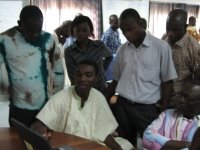In the vodcast with
Nancy Dixon, she said that the theory of communities of practice derived from various anthropological studies and hence is not a Western concept. Afterwards we discussed whether the concept may have touched upon some universal principles of learning, which might also explain why it has become such a popular concept. John Smith commented: Doesn't it take a really deep understanding of the concept to transfer the external trappings of a community, though? The way we organize and support a community in different settings varies a lot! I agree there and think you should not only understand the concept but also the ways of working and learning of the professionals you work with. Sometimes I have the impression the ways of working and learning of professionals varies almost more between professional groups and sectors than between countries.
When I work in Ghana I am conscious of the fact that I don't know the context as a Ghanaian would and try to give different options when I propose something and ask for ideas and feedback.

During the tech forum in Ghana I did a presentation on communities of practice and
we asked for questions and examples of CoPs in Ghana.
The participants could easily identify with the idea of social learning and mentioned various examples of CoPs in Ghana:
* Accra Linux User Group- people with an interest in the same thing come together voluntarily
* Informal women’s groups – shea butter, micro-credit (informal networks, meet to discuss issues)
* Ghana Agric Information network System (GAINS)- researchers sharing information on agriculture, open membership, voluntary, not just libraries
We also asked them what makes CoPs in Ghana work successfully and got the following ideas:
* Common goal exists
* Driven by a common interest
* Varied levels of experience at member’s disposal
* Willingness to share and learn – go out of your way to share
* Belief in what you are doing- I tried this and it worked, so why don’t you try?
* Linking to others that what you know can help
* Learning from masters of work- others can solve the same problem in a few minutes
* Ability to derive social or economic benefit from participation: social- identification/association with the group; economic: learning new skills enhance your economic outlook
* Identification of an issue that people have been struggling with- advocacy and campaigning together eg. linux as alternative to Microsoft
* Clear need to find innovative solutions to solve common pain
Questions we discussed were:
- What is the difference between CoPs and Dgroups?
- Looking at power relations with regard to being a custodian of information, how do communities of practice relate to this part of the world? – ICTs for democratizing information
- Open versus closed membership structures
- Can associations such as GNAFF be considered as a community of practice – an organisation with formal structures versus an informal organisation with learning objectives
- Guilds impose standards versus CoPs defining own standards based on shared practice, expertise/experience
 Oneworld had an article (in Dutch): webloggen populair onder Arabische vrouwen. Women in the Maghreb and the Middle East, especially young women, are starting en masse to blog. For the women they are a chance to express themselves publicly, and for the public it's a chance to know what arab women are thinking and experiencing.
Oneworld had an article (in Dutch): webloggen populair onder Arabische vrouwen. Women in the Maghreb and the Middle East, especially young women, are starting en masse to blog. For the women they are a chance to express themselves publicly, and for the public it's a chance to know what arab women are thinking and experiencing.
















